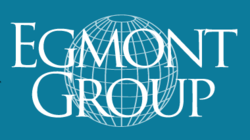Egmont Group of Financial Intelligence Units
(Intergovernmental organization) | |
|---|---|
 | |
| Formation | 1995 |
| Headquarters | Toronto, Ontario |
| Leader | Egmont Group of Financial Intelligence Units/Chair |
| Interests | |
| Subpage | •Egmont Group of Financial Intelligence Units/Chair |
| International organization that facilitates cooperation and intelligence sharing between national financial intelligence units | |
Not to be confused with the Egmont Institute
The Egmont Group of Financial Intelligence Units is an international organization that facilitates cooperation and intelligence sharing between national financial intelligence units (FIUs) to investigate and prevent money laundering and terrorist financing. National FIUs collect information on suspicious or unusual financial activity and are responsible for processing and analyzing the information received. FIUs are normally not law enforcement agencies themselves, findings are shared with appropriate law enforcement or prosecution bodies if sufficient evidence of unlawful activity is found. The Egmont Group is headquartered in Toronto, Ontario, Canada.[1]
History
The Egmont Group was formed in 1995 as an informal network of 24 national FIUs, taking its name from the Egmont Palace in Brussels where the group's founding meeting took place. The Egmont Group Secretariat established its permanent headquarters in Toronto on 15 February 2008.[2] The Secretariat also maintains additional offices in the Canadian capital Ottawa.[3]
Purpose
The goal of the Egmont Group is to provide a forum for FIUs around the world to improve cooperation in the fight against money laundering and financing of terrorism and to foster the implementation of domestic programs in this field. The Egmont Group provides support to member FIUs by:
- expanding and systematizing international cooperation in the reciprocal exchange of information
- increasing the effectiveness of FIUs by offering training and promoting personnel exchanges to improve the expertise and capabilities of personnel employed by FIUs
- fostering better and secure communication among FIUs through the application of technology, such as the Egmont Secure Web (ESW)
- fostering increased coordination and support among the operational divisions of member FIUs
- promoting the operational autonomy of FIUs
- promoting the establishment of FIUs in conjunction with jurisdictions with an AML/CFT program in place, or in areas with a program in the early stages of development[4]
References
- ↑ {https://www.cnbc.com/2020/01/23/reuters-america-world-financial-intelligence-group-re-admits-vatican-after-suspension.html
- ↑ https://web.archive.org/web/20090925141558/http://www.fin.gc.ca/n08/08-014-eng.asp}
- ↑ https://w05.international.gc.ca/Protocol-Protocole/International.aspx?lang=eng
- ↑ https://www.fincen.gov/resources/international/egmont-group-financial-intelligence-units